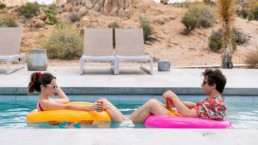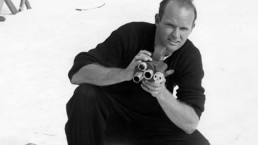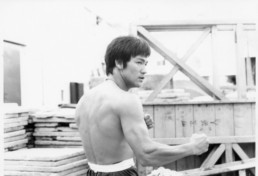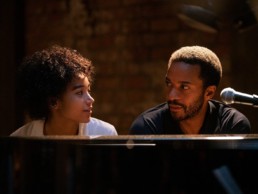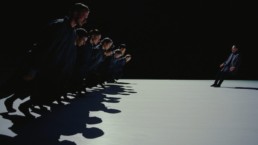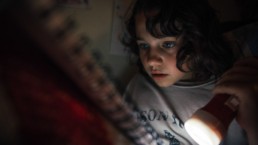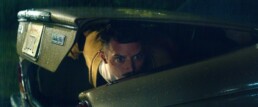'Palm Springs' Is a Hilarious Time-Bending Comedy
Now available to stream on Hulu, Palm Springs (theatrical distribution from Neon) is one of those movies that's better going into blind. Starting with Nyles (Andy Samberg) as he shuffles through a Palm Springs rental on the day of a friend's wedding with apathetic energy, you'll likely feel as if you might've missed something (don't worry, you haven't).
But soon enough, with the unexpected introduction of Sarah, who throws Nyles' day – and world – out of wack, you're now settled in for an all-out, joyous, and hilarious comedy from the wacky, deranged mind of The Lonely Island (Popstar).
The top-billed pairing of Andy Samberg as the beer-cracking Nyles and Cristin Milioti as manic and insecure Sarah make for a delightful onscreen duo, whose chemistry ranges from their having to navigate insane waters together to finding a real romantic connection as well.
And beyond the film's "every day's the same" gimmick – which is executed wonderfully and earns real laughs (with J.K. Simmons getting in on the fun too) – there's also a surprisingly thoughtful and unexpected heart that the film derives its energy from, that of each character's personal insecurities and existential dread that ranges from love, mortality and our place in the universe.
Brought to the screen with applause-worthy comedic chops as well as deft emotional hand by screenwriter Andy Siara and director Max Barkabow (his first feature!), check out this Sundance entry (and nominee for Grand Jury Prize) instantly before you'll want to watch it again.
'Palm Springs' is now available to stream on Hulu.
'Ski Bum: The Warren Miller Story' Review: Celebrating a Ski Legend's Life
"Warren Miller films are an experience."
If, like me, you have never skied in your life, the name Warren Miller is likely a name that you haven't heard before. If however, you are an avid skier, or winter sports fan of any kind, then the name Warren Miller is a legendary one, synonymous with the very sport of skiing itself. As I found after watching the new documentary Ski Bum: The Warren Miller Story, even though I fall into the former category of having not known of Miller, afterwards, I was left moved by the story of a man who – like Steve Jobs, or Henry Ford, or his idol, Walt Disney before him – became a titan of their industry and grew an entire sport itself.
Directed by Patrick Creadon (Wordplay, Catholics vs. Convicts), Ski Bum tells the story of Warren Miller and his 55-year career as a skier and filmmaker, which Miller himself recounts for the film (as Miller would pass away a few short months after sitting for the interview, his presence gives the documentary even more significance). As he remembers at his Orcas Island, WA lodge, growing up a surfer in Hermosa Beach, he would eventually hear the calls of the nearby Californian snowy mountains and shortly thereafter dedicate his life to hitting those slopes – soon proudly calling himself a "ski bum" by dedicating his weekend to sleeping in his car and hunting rabbits to stay up there. Miller would also take his 8mm camera and shoot his skiing, eventually making movies that would snowball (pun intended) into Warren Miller Productions, with Miller shooting, editing, narrating, and marketing these new ski movies himself. His eventual road shows would turn into annual events, gaining legions of fans around the world that would popularize the sport of skiing and in the process, immortalize his name with it.
With interviews from Olympic skier Jonny Moseley and skier/filmmaker Greg Stump, among others, Ski Bum isn't short of subjects willing to sit for the film to celebrate their idol. Yet the most striking part of Ski Bum is the film's use of archival footage, which features never before seen pictures and videos from the Warren Miller Entertainment library. As associate producer and assistant editor H. Nelson Tracey notes, "we accessed film reels that had never before been digitized! There are some unbelievable shots unearthed specifically for this film. In many ways, making this documentary was a bit of a scavenger hunt." This beautifully rendered early-50s and 60s footage transports audiences not only to just beautiful mountain slopes, but to another time altogether.
And while Ski Bum is a gorgeous celebration of the man, the film also digs deeper, past the surface-level snow, to reveal darker moments in Miller's life, including having an alcoholic father, the passing of a first wife, and financial hardships that would at one point bankrupt Warren Miller Productions. It's these moment that his children (who also sit for the film) speculate as to why he himself was a figure who wasn't always there for his family, pursuing his life's mission and larger goals. One thing's for sure: Ski Bum will make you realize the magnificence of a man who saw not just the beauty in mountains, but shared that magnificence to the world, who will celebrate him on the slopes for all time.
Ski Bum: The Warren Miller Story is now available to rent on Amazon, GooglePlay, YouTube and iTunes, as well as available to purchase on Blu-ray or DVD on Amazon.
https://www.youtube.com/watch?v=7JIEYw7LAYk&feature=emb_logo
'Be Water' Review: Bruce Lee Triumphed Over Racism and Transcended
Quick Take: Be Water succeeds in telling the story of the man who would be immortalized as philosopher king, Kung Fu master, and Hollywood legend by showing his biggest battle: a lifelong fight for racial identity and acceptance.
When we think of Bruce Lee, the first images that likely come to mind are of the martial artist in a crane-posed manner, single-handedly pulverizing an entire room full of hapless combatants. Perhaps you're picturing Lee decimate a fleet of enemies in his iconic yellow jumpsuit from Game of Death. Or maybe it's just a general abstract collection of Bhuddist-minded thoughts, illustrating how an enlightened guru once lived among us mere mortals.
While these images are constructive in that they inspire wonder and awe in us, there's also something unfortunate that the mythologizing of a person also does, which is to erase the human at the heart of these myths – and subsequently, invalidating the struggles that they had in their human form.
Be Water succeeds as a documentary in that it focuses on telling the story of Bruce Lee, starting from his childhood and through his upbringing, which we learn was strife with trying to overcome the natural downward pull of systemic racism. Be Water very mindfully takes moments to not only focus on the racially harmful times that Lee faced when he grew up – being born in San Francisco during a time in America where racist stereotypes of Chinese people were not only just embarrassingly present in film and television, but also a short history away after being forced to do manual labor to complete the railroads of today's America.
It's unfortunate that now, in 2020, that we still find ourselves to be a nation that's still fighting for true equality for all of its people. And yet it's also what makes Be Water so incredibly essential to watch as well. Once Lee accepted to not fight resistance, but to go with it – to be like water – Lee was open to pursuing his wildly ambitious dreams, which were to be both a martial arts master and Hollywood star, in an era where neither had been done before in Western culture. Be Water tells Lee's story with both his widow, Linda Lee Caldwell, and daughter, Shannon Lee's contributions, which serve as a majority of the history.
After seeing Be Water, I was moved to see what personal struggles Lee faced that I hadn't known about, and though I was aware that his life was short-lived, still found myself shocked to see when Lee tragically passed away at the age of 32 – mere weeks before Enter the Dragon, his biggest film ever, would open in Hollywood, and cement his legacy forever. If Bruce Lee was, as he spoke about, a pebble in water, then Be Water is a ripple that tells even more to his story.
ESPN’s Bruce Lee 30 for 30 will be available to stream (with a valid cable login) on WatchESPN after it airs on ESPN. Be Water will be available on WatchESPN for 21 days before moving exclusively to ESPN+.
https://www.youtube.com/watch?v=8-R7SZ1wgNY
Yes–You Should be Watching Damien Chazelle's New Jazz Mini-Series, 'The Eddy'
Note for note, The Eddy nails how life, in all of its free-spirited, surprising–and at it's darker core, chaotic and uncontrollable–moments, is like the beautiful harmony of jazz music.
And no other current filmmaker makes that musical leap to film better than Damien Chazelle, who first splashed onto the scene with 2014's Whiplash, only to follow that with the Hollywood musical throwback La La Land, which made Chazelle the youngest Best Director winner in Oscars history. With his newest project, Chazelle side-steps narrative features to get into the mini-series game, here making an 8 episode story for Netflix (now streaming). Centered around American nightclub owner and previously prodigious pianist, The Eddy (the name of the club) tells the story of Elliot (Andreé Holland) trying to save his Parisian nightclub, as well as his band and singer (Joanna Kulig) from going under. Throw in a newly transplanted daughter (Amandla Sternberg) and a mob that's come around to settle their debts, and you get a show that's exciting, gripping, dramatic, and visually stunning (the series was shot on 16mm film, which lends a grain not typical for Netflix or any streamer).
Fans of the director will have already noticed how Chazelle centers his stories around gifted artists whose attempts to achieve greatness through their craft often consume their realities, and audiences will be happy to see similar themes here, with Holland's heartfelt performance driving the show (although each episode follows a different character). But beyond all that, The Eddy is really at its best when the story builds to a musical sequence, at which point it stops to sink into the best jazz jams you've heard, and all from the walls of a real Parisian nightclub (and really, is there anything better than being transported to the heart of Paris while we're all locked down right now?). From the band's on-stage jams, to spontaneous musical moments that sprout up like weeds on the streets, you're going to find yourself rewinding, sitting breathlessly, and snapping to the rhythms from the comfort of your couch.
The Eddy proves that life is just better in the key of Damien Chazelle.
'The Eddy' is now streaming on Netflix.
Stream Netflix’s Musical Short 'Anima', a Dream For These Modern Times
While movie theaters remain closed through this ongoing period of social-distancing, we can look to the abundance of films that are available to watch across all streaming platforms (though do support your local cinema through the purchase of gift cards, if you can).
For this week’s review, I want to take the opportunity to recommend something that is currently available to stream, which you may have yet to see or even have added to your queue. But at only fifteen minutes long (did I mention that it’s a short?), you won’t be outside of your comfort zone for too long.
Now streaming on Netflix, Anima is a musical short film from Radiohead lead singer Thom Yorke and filmmaker Paul Thomas Anderson. Where one could liken Anima to an extended music video, it really does operate as a short film. Ambitiously abstract and conceptual in nature (the film touts itself as a “mind-bending visual piece”), Anima is a loosely narrative story of an unnamed man (Yorke) who, amidst the dream-inducing drudgery of working-class life, finds a woman (Dajana Roncione) only to lose her, and attempts to find her again through obstacles and oppressive forces.
I’m not exactly sure why Anima feels like the right film to recommend this week, given the state of everything right now. But as I think through it more, I find that a few things leap out at me since my initial advanced screening at an IMAX theater last year. Quite simply, the thematic undertones of Anima dramatize how, through the society we’ve created and actively participate in, we have grown to sleepwalk through a mechanized, spiritless life. The amazing choreography by Damien Jalet sees a host of dancers envelope Yorke throughout the piece (with Yorke evoking Buster Keaton-like comedy), and blend movements that are a battle between the soullessly dazed and the spiritually awakened.
I don’t intend nor wish to hide the fact that I am also a fan of both Yorke and Anima’s filmmaker, Paul Thomas Anderson (if you need a further recommendation of a film to see, I highly suggest The Master and Phantom Thread). Beyond the film’s other artistic credits (with projections by Tarik Barri and photography by the great cinematographer Darius Jhnodji), Anima leaves the viewer with a very real sense of what dreaming through real life can feel like. Now feels like a moment where we’ve all woken from a shared, comfortable dream, and must reassert how we wish to live our lives now that we’ve awakened.
ANIMA (2019)
Starring Thom Yorke, Dajana Roncione
Directed by Paul Thomas Anderson
Distributed by Netflix. 15 minutes.
'Wendy' is a Gorgeous Ode To Never Growing Up
While the story of Peter Pan is one that is beloved by generations of people, has there actually been a film that's done it justice on the big screen?
Arguably, yes. Perhaps the most celebrated entry remains the 1953 animated film from Walt Disney (a formative movie for this reviewer). And who could forget Steven Spielberg's 1991 take in which Robin Williams starred as a grown-up Peter who had lost his identity? But beyond those films, a scattering of poorly received made-for-TV-movies, as well as ill-fated studio blockbusters, have unsuccessfully tried to bring the story of Pan to the big screen, to an unreceptive response. So why don't the majority of these movies do service to the story of Peter?
As I found while watching Wendy at its Sundance World Premiere, the answer appears to lie beneath what most films celebrate: swash-buckling with pirates, cartoonish Neverland, fairies, and more. At its heart, what most movies miss are the key fundamental human challenges: that of never growing up and the death we accept when we grow hardened, therefore losing the ability to see the world of openness and possibility.
And that idea is precisely what director Benh Zeitlin centers his reimagining around, and what makes Wendy of the most welcomed entries into the Peter Pan filmography.
So what makes Benh Zeitlin's reimagining of Peter Pan so great? Well, let's start by talking about its director, Benh Zeitlin.
As you may or may not know, in 2012, Benh (pronounced Ben) made his feature film debut with a little movie called Beasts of the Southern Wild. The film tells the story of a young girl living in an impoverished yet spirited New Orleans community who escapes her circumstances as well as an impending catastrophic storm by imagining fantastical worlds. It was a breakout hit, nominated for multiple Academy Awards, including Best Picture, Best Director, and Best Actress (at nine-years-old, Quvenzhané Wallis is the youngest ever nominee for the Academy Award).
Since then, audiences have eagerly awaited Benh's return to the big screen. Well, eight not-so-short-years later, it's finally here, with Benh returning to adapt the beloved story of Peter and make it his own, setting the film in a place of real-world fantasy akin to Beasts. In his version, spirited, untamable children who yearn for adventure are brought down by lifeless, joyless grown-ups, existing in body but far gone from their childhood selves.
It's with this spirit that Zeitlin centers the story of Peter Pan around his main character, Wendy (Devin France). Wendy and her two brothers Douglas and James (Gage and Gavin Naquin) become lured by a curious, boyish figure outside their bedroom window atop a bustling freight train. As impulse leads Wendy and her brothers to follow the mysterious boy, they find themselves a world away, on an island of magnificent wonder where they're free from their previous life's confinements. Finding similarly stowed away kids, these "lost boys" are unbound in daily adventure. Wendy and her brothers remain transfixed by the one who led them out the window, the wise-as-he-is-playful character, Peter (Yashua Mack), whose orders to "never grow up" come more like a dire warning should they do.
It's here, in these moments of shared play, that the film is at it's most powerful and touching. Gorgeously crafted sequences of kids running and playing are beautifully lensed and set to sweeping, heightened symphonies that, for those few minutes, truly do bring a tear to one's eye as bottled moments of the spirit of life.
What makes Wendy so rich is that it unpacks the rest of the mythology of Peter Pan, giving unexpected and insightful reason behind the known elements that make up the rest of the story: Those who have grown old and desperate on the island who threaten the lost boys, a pirate ship in the form of a large fishing boat, and yes – the rise of Peter's infamous foe, Captain Hook. Ironically, I find that it is these elements that, at times, holds the film back, as its dutiful ties to its source material make it somewhat predictable to see where the narrative goes. I say "predictable" quite loosely, though, as it's such joy to see how Benh and co-screenwriter and sister Eliza Zeitlin explain each of these storybook elements so organically and how they fit within the story of real-world interpretation.
And of course, magical realism does abound in the film. Fantastical elements dance with reality, where playfully eruptive volcanoes and the island's protecting oceanic-dweller, "Mother," expand the world even more. It's in these moments where audiences will ask themselves, "Is this all real?" And that question is answered by, if you choose to see life through the eyes of a child, it is.
It's for these reasons combined that Wendy is not only one of the most welcomed entries into the Peter Pan filmography, but one of the most accomplished films about childhood in recent times. Benh Zeitlin is an artist who, with his singular immaculate vision, celebrates the world of seeing life with wonder, awe, fearlessness, curiosity, zest, and untamed spirit. And that's what I found most movies about Peter Pan miss, and makes the classic story what it is: a story of embracing life that will never age, as long as its readers and audiences never do either.
WENDY (2020)
Starring Yashua Mack, Devin France, Gage Naquin, Gavin Naquin
Directed by Benh Zeitlin
Written by Benh Zeitlin, Eliza Zeitlin
Distributed by Searchlight Pictures. 112 minutes. Opening this Friday at ArcLight Hollywood and The Landmark.
https://www.youtube.com/watch?v=KKktQFFcXL0
'Standing Up, Falling Down': The Ever-Endearing Comedy of Crystal and Schwartz
If Ben Braddock of The Graduate had a wise-cracking older mentor in his life to help guide him through the anxiety of post-graduate adulthood – and if that mentor was the inimitable Billy Crystal – you might get something similar to Standing Up, Falling Down, a feel-good buddy comedy about the unlikely friendship between an unsuccessful young comedian and his life-affirming dermatologist.
Making its world premiere at the Tribeca Film Festival, the comedy settles on the softer side, bordering on conventional clichés that makes for familiar beats, but is still a light-hearted look at moving on, brought to life by a pair of wonderfully charismatic performances.
Stand-up comedian Scott (Ben Schwartz) isn't so much down on his luck as he is failing to realize he keeps playing the same bad band. With his comedy career going nowhere fast, he leaves L.A. to move back in with his parents in Eastern Long Island, which, at thirty-four, hits on a certain anxiety of this millennial generation that feels honest. Now home, Scott is forced to confront the life he left behind for the dreams of L.A. – and the people he left, including sister (Grace Gummer) and ex-girlfriend (Eloise Mumford). In his grief state which warrants a medical check-up, he meets the karaoke-loving dermatologist, Marty (Billy Crystal). It's not long before Marty's natural cheer mixes with Scott's cynical self, and the two find themselves getting along – having drinks, smoking pot, hanging out, and without knowing it helping each other move on from a rut.
Wearing its heart on its sleeve, Standing Up, Falling Down probably won't find its way into the classics of all-time buddy comedies. But this earnest little flick from director Matt Ratner (who produced both of 2015's Manson Family Vacation and Band of Robbers) should delight those looking for a light, enjoyable film that digs into substantial themes when it wishes to. It certainly will find itself being watched by the faithful fans of the film's stars, Billy Crystal and Ben Schwartz. What certainly intrigued me about this film was the anticipation of the comedic pairing between two comic talents who I personally acknowledge as being part of my love of comedy in their own ways. Schwartz, perhaps most widely recognized as Jean Ralphio in Parks and Rec and who's seeing his own star rising as of recently (voicing the main blue speedster in Sony's Sonic the Hedgehog opposite Jim Carrey), carries the film from start to finish with his affable and casual charm. But it's Crystal that proves his legendary status, taking this lovable character and making him all his own. Crystal's warm-hearted wit and heart of gold will make you laugh, which makes the moments of true loss that much more emotionally weighted.
While the film's title could have been called Standing Up, Falling Down and Standing Back Up Again and probably have the same effect, more or less spelling out its intentions every step of the way, it is still an enjoyable and pleasant watch. The pairing of two truly amazing comedians with natural comic chemistry will show you what it's like to move on from hardship and have a fun time doing it.
This review originally ran on May 1, 2019, during the Tribeca Film Festival.
STANDING UP, FALLING DOWN (2019)
Starring Billy Crystal, Ben Schwartz
Screenplay by Peter Hoare
Directed by Matt Ratner
Distributed by Shout! Studios. 91 min. Opening this Friday at the Laemmle Royal.
'Come to Daddy': Elijah Wood's Got Seriously Dangerous Daddy Issues
The funniest and wildest movie I saw at the Tribeca Film Festival this year was the suggestively-titled Come to Daddy, a film whose dark comedy made for a perfect inclusion in the midnight section of films.
What starts out as a slowly built, dry comedy of the uncomfortable reunion between a son and his estranged father ends up being a wonderfully insane and absurd film that is sure to make audiences laugh.
Come to Daddy opens with Norval (Elijah Wood) arriving at the secluded beachside cabin of his father (Stephen McHattie) after receiving a letter requesting a reunion, despite not hearing from his dad since he left him and his mother as a child. But Norval is confused – when he arrives at the residence, his father, grizzled and gruff, doesn't seem ready to reunite. In an odd way, Norval feels like his dad is actively inflicting violence, until an unexpected moment immobilizes him, leaving Norval alone without the reunion he deserved. At least, that's what he thinks, until things get incredibly twisted.
At this point, explaining further would ruin all of the fun of the film, so I won't divulge much more. Just know that Come To Daddy is wild and raunchy and has a good amount of comedic violence that makes this an unconventionally fun time. Think Swiss Army Man meets the little-seen Netflix gem I Don't Feel at Home in This World Anymore which also stars Elijah Wood. You can expect that Wood is always going to involve himself in these types of movies, which we fully stand behind. If you're ready to laugh by way of shockingly-gratuitous yet still comically-minded violence, you will find yourself entertained by this playfully twisted yet uniquely-envisioned film that is more than a major accomplishment from first-time feature filmmaker Ant Timpson.
COME TO DADDY (2019)
Starring Elijah Wood, Stephen McHattie
Directed by Ant Timpson
Written by Toby Harvard
93 minutes. Rated R. In Select Theaters Nationwide + Available on Digital & VOD on February 7, 2020.
This review was originally published on April 30, 2019.

